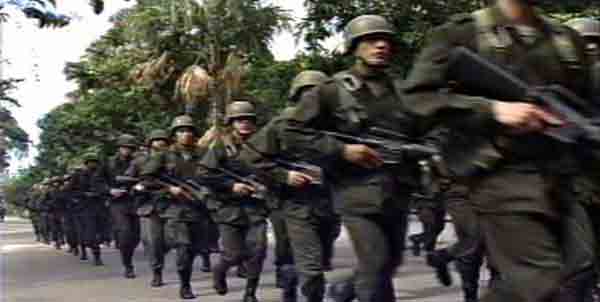

Allegedly intended to fight the production of coca and cocaine in Colombia, the $2 billion-U.S. "Plan Colombia" assistance package (currently renamed "Andean Initiative") has 80% of its aid going to the Colombian police and military for weapons, training and helicopters. While this policy meant huge contracts for U.S. defense contractors paid for by U.S. tax-payers, it translated into abruptly stopping a peace and dialogue process between then Colombian President Andres Pastrana and the leftist rebel groups, stepping up the war in the country's 50-year civil struggle. Recently elected Colombian President Alvaro Uribe has actually intensified the fighting against the two main rebel groups, the FARC (Revolutionary Armed Forces of Colombia) and the ELN (Army of National Liberation) with newly delivered U.S. weapons and helicopters.
Colombia is now sinking into a hellish spiral of violence with more bombings and kidnappings, more disappearances and murders of opposition figures and union leaders and intensified warfare by the Colombian military. Plan Colombia is helping to combat the leftist guerilla-movements, not the narco-traffickers.
While the U.S. Congress had demanded that U.S. military assistance be used only to fight drug-trafficking and not to meddle in the Colombian civil war, the U.S. State Department has found a way to sidestep this issue by officially announcing a shift in priority from fighting drugs to fighting so-called "terrorism". This makes it easier to target the actions of irregular armed groups in Colombia with a focus on leftist groups controlling territories rich in natural resources, oil in particular.
